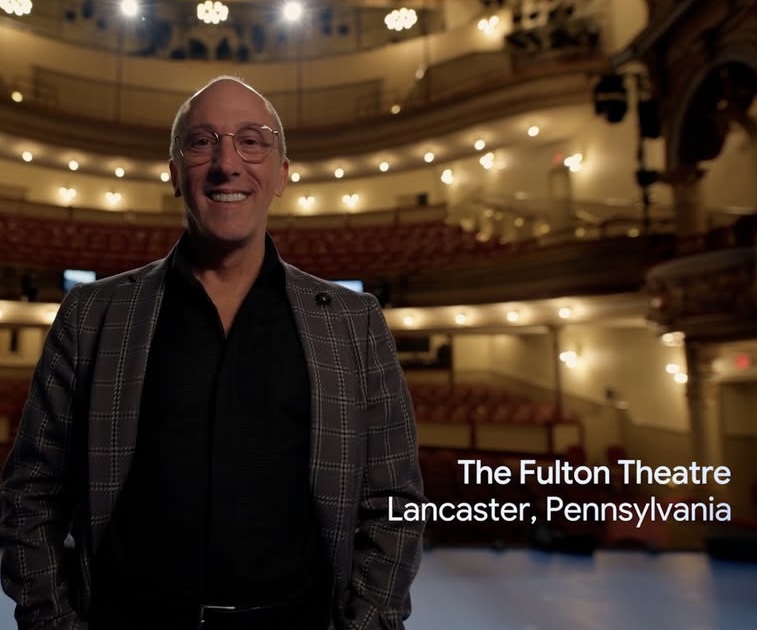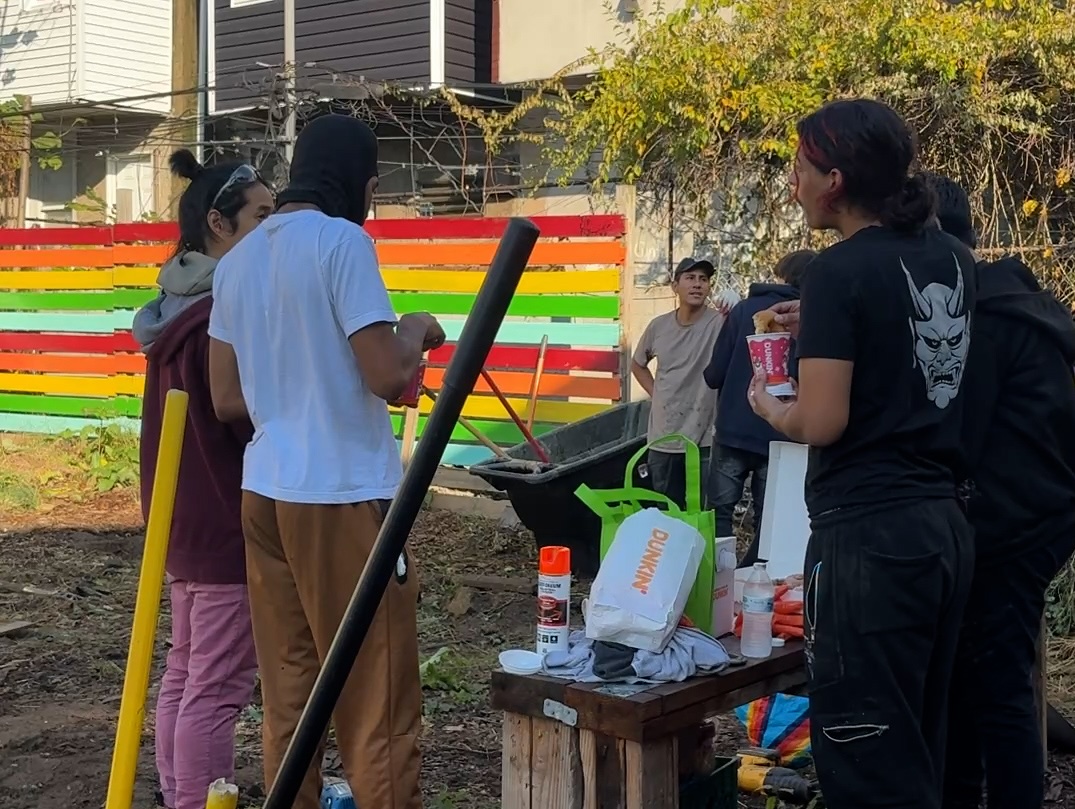As a mob of about 10 actors in rehearsal clothes exits through a heavy white door into the box office at the Fulton Theater, my eyes instantly dart to the Harry Potter sweatshirt and delighted grin heading my way. The passion in Marc Robin’s voice is palpable. As Fulton’s executive artistic producer, he has to maintain a certain vibrant energy. “Welcome in!” he exclaims, leading me through the same white door and up a set of spiral stairs into the Producers Circle Lounge.
It’s a cold, snowy February afternoon, and the lounge—from the burgundy decor to Robin’s Harry Potter sweatshirt—is reminiscent of a scene from Dead Poets Society. It’s a comfy, plush room adorned with an expresso-brown Chesterfield leather sofa on one side and a set of matching Victorian-style armchairs on the other—decor pieces that double as set design for the theater’s multitude of weekly productions. Apparently, important people come up here.
A few months ago, Google contacted a handful of small businesses to test its new Gemini AI chatbot, and Fulton was the only theater in Pennsylvania invited. Robin primarily uses Gemini to streamline Fulton’s theater operations. Theater shapes communities, and without focusing on its financial growth, it may not survive. But the financial side of theater can be dreadful when grant proposals take up to months to complete. This is where Gemini comes in, adding speed and efficiency, relieving the paperwork part of the job, including research for grants. It allows Robin to focus more time and effort on the artistic elements.
“If I want to run analytics on every theater within a 75-mile radius of all their ticketing structuring and pricing, I can do that,” he says. These types of analytics can take hours to perform. When he tried comparing two grants that Fulton applied for, Gemini instantly analyzed thirty pages of information.
Fulton had been using Gemini for only three months on a trial basis when the Super Bowl ad rolled out. During America’s biggest sporting event, Google strategically launched its ad campaign, “50 States, 50 Stories,” featuring Fulton Theater. The ad opens with Robin standing center stage at Fulton, wearing a black dress shirt and slacks with a brown plaid blazer.
“Theater is my blood. That is my passion,” he says, direct-to-camera. The ad goes on to highlight the community aspect of theater and how Gemini eases Fulton’s workload—“So we can focus on growing our theater.” That’s Robin’s final line in the commercial, which ends with him pirouetting across the stage, his face spirited.
Since the Super Bowl ad aired, the public debate over how AI will factor into the creative process has only intensified. At a time when the entertainment industry is still figuring out how to use AI ethically without compromising creativity (and jobs), Robin acknowledges the pitfalls of this new technology but insists that he plans to continue using Gemini solely to manage the theater’s workflow and operations—and not creatively.
“What we do requires a beating heart to do,” he says.
Robin believes the arts are often overlooked in large-scale advertising, so his local theater’s inclusion in the ad felt significant. The art world is unique compared to the other businesses featured in Google’s ad campaign.
“We are natural storytellers. So it’s going to be different than if we are trying to talk about our farming product. Not to say that farmers don’t have great stories. They do.” He laughs. “But I think part of the reason the theater industry sparked [Google’s] interest is because there is a way to tell our story that is different from somebody else.”
***
Robin has been attached to theater his whole life. At age 4, he played Toto in Fulton’s production of The Wizard of Oz. As a high school junior, he was accepted into Fort Lauderdale High School of Performing Arts. He spent the following year and a half at Florida Atlantic University, where he discovered his love of dance. He remembers being in a tap class one day when one of his teachers noticed his talent and encouraged him to pursue his passion. Tap was his calling.
“Put a pair of tap shoes on me, and I found heaven,” he says, beaming. After 20 years on stage in tap shoes, from dance captain to assistant choreographer, he was cast in a Chicago production of The Wizard of Oz in 2015—this time as the Scarecrow.
His career came to a halt when he tore all of the ligaments in his ankle. He recalls, “It was one of those chorus line moments of: What are you gonna do if you can’t dance anymore?” Soon, he realized he didn’t have to pursue the art form he loved on a stage. He could execute it from behind the scenes. He loved organizing productions just as much as he loved performing in them.
Robin has evolved alongside Fulton over the years—particularly when it comes to adopting new technology. Still, various ethical concerns surround AI, including the fact that AI models are often trained on biased data that doesn’t accurately reflect real-world demographics.
“AI can be such a powerful tool, but we need to be careful about what systems we let it integrate with and what tasks we ask it to perform,” says Chris Reed, who teaches computer science at Brandywine Heights School in Topton, Pennsylvania. “The industries that will benefit the most from AI will be the ones that learn how to use it as a tool that partners with humans to do traditional tasks.”
Reed cites dermatologists as an example—some currently use AI to help identify areas of concern on a patient’s skin. “This is sort of an AI-Human collaboration,” he says.
Robin agrees. “A computer cannot tell you what you are looking at, and it can’t tell you how you are gonna feel while looking at it, symphonically,” says Robin. For more analytical information, like identifying all the props in a script, though, AI can be crucial. Robin believes other art forms could effectively integrate these tools. “But even then, the artist has to sign off on designing this room for me,” he explains, gesturing around the Producer’s Circle Lounge. He offers a series of examples: “‘I want it to look like a Victorian Old Gentleman’s club from 1906.’ ‘I want the curtains to be burgundy.’ ‘I want the couches to be brown.’” Artistic direction is, of course, still up to the artist.
Although funding for performing arts remains relatively low across the board, Robin says the Super Bowl ad has already boosted Fulton’s profile, showcasing the theater’s innovation over the years. But while Fulton has made significant strides in its use of technology, AI will never replace the humans who create the art on stage.
“We’re just beginning to have conversations about how we encourage or discourage the use of AI,” says Robin. “Because I didn’t hire humans to be voices of the organization just so they could lose their voice to automation.”


